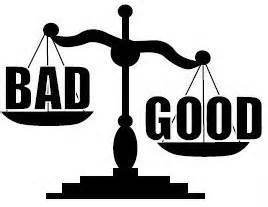I don’t believe in ‘good people,’ but I believe in goodness
 When Miley Cyrus appeared on the Jimmy Kimmel show wearing pasties, Kimmel asked her what her father would think of that outfit choice. Cyrus replied, ““My dad’s cool because I’m sure he’d maybe rather not have me have my tits out all the time, but he’d rather me have my tits out and be a good person than have a shirt on and be a bitch.”
When Miley Cyrus appeared on the Jimmy Kimmel show wearing pasties, Kimmel asked her what her father would think of that outfit choice. Cyrus replied, ““My dad’s cool because I’m sure he’d maybe rather not have me have my tits out all the time, but he’d rather me have my tits out and be a good person than have a shirt on and be a bitch.”
This isn’t a post about modesty (or lackthereof), but an idea that I’ve discussed before on this blog, and continue thinking about in my daily life offline: what is a “good person,” and who qualifies?
I’ve stated previously that I don’t buy into this idea of “really good people,” precisely because there are as many definitions of “good” as there are people. The “Good person/Bad person” dichotomy suggests some kind of scale in which we weigh our deeds, and who has time for that? Furthermore, wouldn’t our definition of “bad deeds” still be biased in our favor? “No, I shouldn’t have posted that mean tweet about my boss, but she is a bitch…”
I don’t think accepting that no one is truly “good” means that evil is the default. That seems like a heavy Calvinist-leaning idea, which I don’t buy into. Speaking for myself, realizing I’m not a “good person” means having a healthy awareness of my flaws, and recognizing that I sin on a daily basis. Even the people I know who seem like paragons of righteousness probably have battles within their hearts I’ll never know anything about.
I’m reminded of something C.S. Lewis says in his book Mere Christianity. He doesn’t dismiss other religious ideas as flat-out wrong, which I deeply respect. Instead, supposing that there is an Absolute Truth out there, some religions contain pieces of it, or come closer to it than others. The same goes for our own actions and attitudes towards others: I can think of a few people who are not Christian, but have a better understanding of Christ-likeness than many self-professed Christians do. Ergo, maybe it’s possible that some people are following Christ – or at least his teachings – without knowing it.
That’s something I thought about when someone in one of my classes at seminary raised the question of whether the Jews – God’s chosen people – are in hell because they “rejected” Jesus. You can imagine just how much I loathe this question, but my understanding is that the people who wrote the laws Jesus himself endorsed definitely know a thing or two about the character of God. I can’t elaborate very much beyond that, but I believe that God makes himself accessible in a multitude of creative ways, whether we recognize it or not. I’m thankful that it’s not my job to judge the condition of others’ hearts.
Filed under: Religion Tagged: Christian culture, Christianity, Controversy, Judaism











